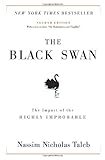1) it depends on the work 2) it depends on the type of production 3) it depends on the person 4) it depends on the time scale
i believe that those who think they are superhuman are mostly wrong, but some of them are right. wasn't it kahneman and tversky who measured confidence and for people over-estimated their skills? i'm pretty sure 95% of swedes believe that they are better than average in sweden (read taleb's the black swan#). and then there is the Dunning-Kruger effect^ which describes the underestimation of skills by the skilled and the overestimation of skills by the unskilled, the n00bs as it were. so i consider self-selection specious. i want to see a measure of the guys who didn't toot their own horn, or more appropriately, those recognized by their peers as being exceptional.
† production on long time scales does not fit to the bell curve because it can be 'bumpy', but normalized for innovation it should
# http://www.amazon.com/Black-Swan-Impact-Highly-Improbable/dp...
You can actually ask your question there as well in case this question gets unnoticed on HN; Quora people are very smart and pretty responsive
see http://en.wikipedia.org/wiki/Stochastic_process, http://en.wikipedia.org/wiki/Random_walk and do a search for Random Processes or Stochastic Processes on Amazon bookstore
Read about Entropy: http://en.wikipedia.org/wiki/Entropy A good book on Information theory can help you put it in context: http://www.amazon.com/s/ref=nb_sb_ss_c_1_18?url=search-alias...
Check out GMP http://gmplib.org/
If you're philosophically inclined read some existentialists, they deal a lot with irrationality and chaos: http://en.wikipedia.org/wiki/Existentialism
If you're financially inclined read Random Walk Down Wall Street: http://www.amazon.com/Random-Walk-Down-Wall-Street/dp/039331 and the Black Swan: http://www.amazon.com/Black-Swan-Impact-Highly-Improbable/dp... you may want to check out his other book as well, it is rather non-technical: http://www.amazon.com/Fooled-Randomness-Hidden-Chance-Market...
To learn more on how Wall Street deals with the stock market randomness read some books on Time Series analysis and forecasting, e.g the classic http://www.amazon.com/Time-Analysis-Forecasting-Probability-...
If you are a data scientist in heart read this great Q&A thread: http://www.quora.com/How-do-I-become-a-data-scientist
I wish I could help you with a link to a clear non-technical introductory article but this is all I've got. As random as it gets:)
Probably some good introductory book on science will fit the bill, science after all deals primarily with randomness. You may want to check out http://www.amazon.com/G%C3%B6del-Escher-Bach-Eternal-Golden/...
Basically, Taleb says the event must be:
1. Quite difficult to predict
2. Have an significant impact
3. Be able to be explained rationally, after the fact
Examples include September 11th attacks, the personal computer, Google and others.
-----------------
Read more about at your desired level of interest:
wiki: http://en.wikipedia.org/wiki/Black_swan_theory
video: http://www.youtube.com/watch?v=BDbuJtAiABA
pdf: http://www.fooledbyrandomness.com/ARTE.pdf
book: http://www.amazon.com/Black-Swan-Impact-Highly-Improbable/dp...
-----------------
Note: I found the writing style of the author to be a little quirky. You may want to read a sample chapter at local bookstore before going all in.
Nassim Nicholas Taleb also addresses this topic in some depth in his book "The black Swan" (http://www.amazon.com/Black-Swan-Impact-Highly-Improbable/dp...).
The fellow's predictions in the past have missed the big events: don't bother trusting his newest predictions.
A "sell the company" business model is like becoming an actor with a mind of becoming rich like Tom Cruise. No doubt some people who do it will find some success, but by definition this is something that (a) works only for a small number of people (the world needs a limited number of movie stars, Google & Co acquire a limited number of companies) and (b) contains a large element of luck - many actors have comparable talent & looks, many companies can (and a few already have) build a Twitter-like product.
The Black Swan by Nassim Nicholas Taleb is a great book about the randomness in our lives: http://www.amazon.com/Black-Swan-Impact-Highly-Improbable/dp...
http://www.amazon.com/Black-Swan-Impact-Highly-Improbable/dp...
http://www.amazon.com/Black-Swan-Impact-Highly-Improbable/dp...

